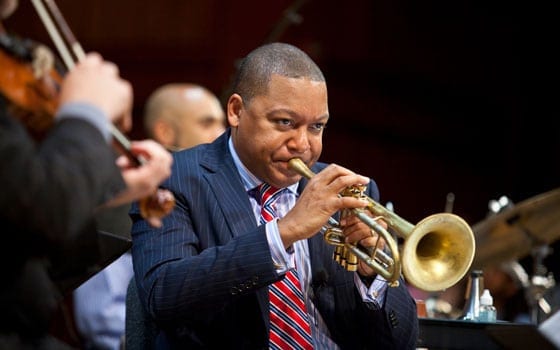
Music — especially blues and jazz — has little bits of all of us in it according to celebrated jazz musician Wynton Marsalis.
Last Thursday, Marsalis’ lecture and performance “Music as Metaphor” at Sanders Theatre was the kick-off for a two year initiative “Hidden in Plain View: Meanings in American Music” with Harvard University. The series is the latest example of Harvard’s commitment to integrating arts and education.
The nine-time Grammy award-winning trumpeter, documentarian and author is also a gifted griot that expertly stitched together quotes from Bessie Smith, Louie Armstrong and Nietzsche that attempted to capture in words the essence of music.
With more than 70 albums to his credit, Marsalis delivered a poetic soliloquy peppered with musical vignettes for more than three hours to make audiences feel its significance. He taught concertgoers that the rhythm section is the foundation of music and the epitome of sacrifice.
The rhythm section sets the tone and the pace but is always relegated to the back of the stage, never getting the glory. Coupled with the delicacy of strings and the charisma of soloists, each section comes together in a melody or riff to say something.
He talked about the evolution of certain genres of music such as Negro spirituals and the blues borne out of the hearts of slaves bearing heavy burdens. Injustices like slavery, internment camps, wars and other cruelties have spawned beautifully painful melodic contributions from all over the world. But it’s up to music lovers to be in tune with where the artists are coming from and receive their messages.
Throughout the ages, artists have been truth tellers for civilization; they speak about the essence of their society in ways that others cannot or will not. “You need to listen to what’s being said,” he explained.
The New Orleans native is the artistic director at the Lincoln Center, and holds an honorary doctorate from Harvard. Marsalis’ motifs for his lecture were love, listening and the connectedness of the human spirit.
Learning the “math of music” or music theory is not enough to move people. All the notes can be in the right place and the music can be technically sound, but if the person’s soul is not in it, then nothing is being said.
Humbly, he urged audience members to listen ever so carefully to what a song is saying.
In 1995, Marsalis worked on a documentary called “Marsalis on Music” where he asked numerous musicians what music means to them, and every musician talked about some form of love. Whether it’s blues, jazz, techno or rock, Marsalis claims that all music is essentially the same because it comes from the same place — the spirit. He said he believes it can help us live our nation’s creed and transcend our differences.
“This music cost us a lot,” Marsalis said. “But not knowing what it means, costs us a lot more.”






